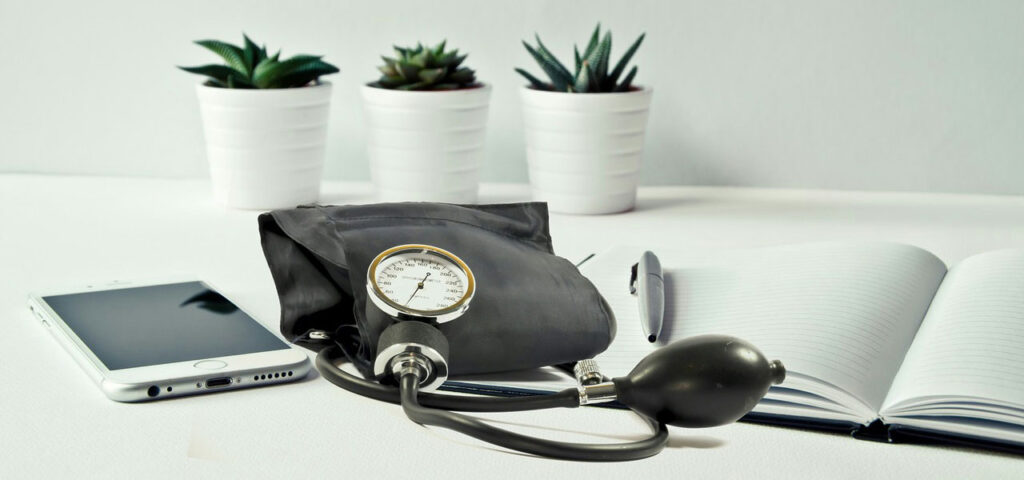
The Centers for Disease Control states that heart disease is the leading cause of death in our country and a heart attack occurs every 40 seconds in the United States. Decreasing risk factors for heart disease such as high blood pressure is an important step in preventing your risk for heart disease including having a heart attack. Additionally, acting quickly is critical in surviving a heart attack.1,2 Learn more about high blood pressure and information regarding heart attacks below!
Blood Pressure
What is blood pressure?
Blood pressure is defined as the force of blood pushing against blood vessel walls in your body.
How does blood pressure relate to heart health?
Consistent high blood pressure can cause your arteries to be less elastic, which causes a decreased flow of blood and oxygen to the heart. This decreased blood flow can lead to cardiovascular disease, such as chest pain, heart attack, or heart failure. Keeping your blood pressures within the recommended range will help to keep your arteries elastic, or able to stretch and relax normally.
Risk factors for high blood pressure:
Risk factors for high blood pressure can be modifiable or non-modifiable. Non-modifiable factors include a family history of high blood pressure, older age, gender, race, and chronic kidney disease. Modifiable factors that you can adjust to prevent high blood pressure include a lack of physical activity, an unhealthy diet, being overweight, high cholesterol, diabetes, smoking/tobacco use, and a high-stress environment.
What should my blood pressure be?
The American College of Cardiology/American Heart Association recommends that patients with high blood pressure should maintain a blood pressure less than 130/80 mmHg.
What lifestyle modifications can I make to keep my blood pressure controlled?
There are many things that you can do to maintain a controlled blood pressure. Lifestyle modifications can include adjusting your diet to be well-balanced with fruits and vegetables and low in salt, limiting alcohol intake, managing stress in your life or job, quitting smoking, and having a regular physical activity regimen for at least 150 minutes per week.
How do I take my blood pressure at home?
When you are at home, you can use a digital blood pressure monitor with an arm cuff. You should take at least two readings that are one minute apart in the morning before taking any medications and in the evening before dinner. The bottom of the cuff should be placed above the bend of the elbow on either arm. Make sure you are relaxed with your feet flat on the floor and back straightened against the back of the chair. To get the most accurate reading, you should rest in a chair for at least five minutes with your arm resting on a flat surface at heart level. Make sure to not smoke, exercise or drink caffeinated beverages or alcohol within 30 minutes of taking your blood pressure. Keep a record of all results to show to your provider at scheduled visits.
I need to visit the doctor, but I don’t have health insurance. What should I do?
You might qualify to receive care at the Campbell University Community Care Clinic (CUCCC). The CUCCC offers services and medications to underserved patients that are in need of care and do not have their own health insurance. Please contact 910-505-0435 to determine if you qualify for care by the CUCCC.
Blood Pressure Numbers
Heart Attacks
What is a heart attack?
A heart attack occurs when the flow of blood to the heart is blocked. The blockage is most often a buildup of fat, cholesterol, and other substances, which form a plaque in the coronary arteries.
What are the risk factors for a heart attack?
Risk factors for a heart attack include age, tobacco use, high blood pressure, high blood cholesterol or triglyceride levels, obesity, diabetes, family history of heart attacks, lack of physical activity, and stress.
What are some ways to prevent a heart attack?
- Healthy diet
- Regular physical activity
- Stop smoking
- Manage stress
- Maintain controlled blood pressure and cholesterol levels
What are the signs and symptoms of a heart attack?
- Chest pain
- Nausea
- Shortness of breath
- Cold sweat
- Fatigue
- Dizziness
What should someone do if they are experiencing these symptoms?
- Call 911: Don’t attempt to tough out the symptoms or drive yourself unless it’s the last resort.
- Chew and swallow an aspirin: Don’t take it if you are allergic or have been told by a doctor not to take aspirin.
- If you are with someone who is experiencing a heart attack begin CPR and get an AED.
Additional Resources
- American Heart Association | To be a relentless force for a world of longer, healthier lives
More information about heart health provided by the American Heart Association
REFERENCES
- CDC. Heart Disease Facts & Statistics. Centers for Disease Control and Prevention. Published September 8, 2020. https://www.cdc.gov/heart-disease/data-research/facts-stats/?CDC_AAref_Val=https://www.cdc.gov/heartdisease/facts.htm
- Gindi R. Health, United States, 2019. Published 2021. Accessed March 23, 2021. https://stacks.cdc.gov/view/cdc/100685